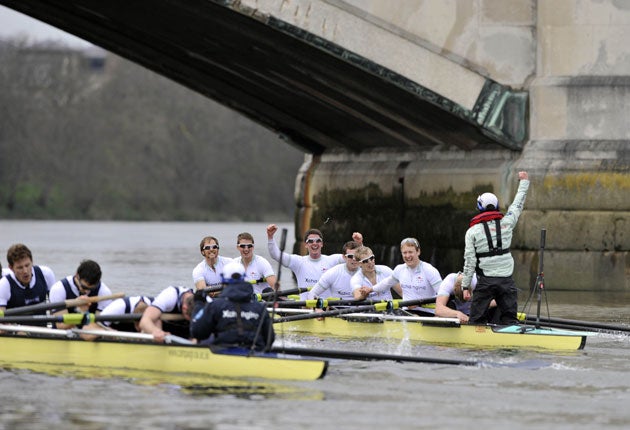Boat Race: Cambridge triumphant in clash with Dark side
Blades collide to keep umpire busy as Boat Race produces an enthralling battle between evenly matched crews

Cambridge came from behind to win the 156th Boat Race in a bruising side-by-side encounter under a grim sky. Oxford won the toss and chose the Surrey station in anticipation of strong winds and forceful squalls, but the weather gods visited the four-and-a-quarter-mile course from Putney to Mortlake with nothing more than a benign breeze.
Both crews began gingerly on flat water and Oxford, the favourites, showed an immediate lead. After a minute they were half a length ahead and drawing the attention of the umpire, Simon Harris, by heading towards Cambridge in a bid to gain the best advantage of the tide by forcing the Light Blues off it. Cambridge's cox, Ted Randolph, was having none of it and nor was the umpire, who began a lengthy stint at the semaphore. It took Oxford two minutes to extend their lead to two thirds of a length, but as the mile post passed only a second separated the boats.
Then a sustained tussle began as the crews attempted to reach Hammersmith first, with knitting blades and a series of warnings, to Cambridge and then to Oxford. Oxford's cox, Adam Bowden, moved perhaps too close to the Surrey shore and forced himself to come out into the tide again. The boats were close and umpire Harris was at his wits' end. "At times the coxes weren't moving," he said. "There's a tendency that if one thinks the other's moving, he thinks, 'I'll slide across'."
Oxford reached the bridge at Hammersmith about a length up and they would have hoped to romp away, with a long bend in their favour. But they had not reckoned on the tenacity of this Cambridge crew. They had kept their cool and their easy rhythm for the first third of the race and they were too close to Oxford to be pushed off the tide. A series of hard strokes gave them an inexorable advance.
As the building that marks the halfway point was passed, Cambridge crept up until they were half a second in front at Chiswick Steps, where the bend once more came to favour them. This was the Light Blues' turning point. Their coach, Chris Nilsson, said: "I knew that Oxford would give it to them at three points on that Surrey bend and I knew that if we stuck in at each of those critical parts of the bend and held, then we would be OK."
Around the Middlesex bend, past Duke's Meadows, there was more clashing and Harris was again busy with his flag, mostly aimed at Oxford. Another Cambridge push took them to a quarter-length lead at Barnes Bridge, where in normal circumstances a little relaxation would be in order. But here, shooting the bridge, their stroke, Fred Gill, almost lost his oar, taking an air shot, his blade making no contact with water. He recovered by the next stroke to fend off an attack from the Dark Blues, who clung on as tenaciously as the Lights had done from Putney to Chiswick. It was only in the last 100 metres that Cambridge felt that the door was closed.
The presidents, Oxford's Sjoerd Hamburger and Cambridge's Deaglan McEachern, were in opposite seats last year, when the Dutchman won. Yesterday it was the American's turn. "Ted didn't call when we came level. I just noticed it," McEachern said. "There was a lot more boat alongside than before, so we just had to keep pushing and the race was ours. The start was pretty bad. They really went for it, but let's stick it out, race along and they won't get away. There were a ton of clashes, and Henry [Pelly] lost his oar a bit."
Hamburger said: "All credit to Cambridge, they raced an incredible race and they were better than we were today. We slowly ran into trouble and couldn't finish it off. No one won or lost the clashes and it wasn't a determining factor. I'm extremely proud of the boys."
Nilsson, in the second year of a three-year contract, having lost last year, said of the clashes: "I believe the other side tend to use that as a ploy. I don't like it, but Ted steered the most incredible course today." Randolph said: "It's fantastic. All the way through I was thinking, 'We can win, we can win, we can win it,' and near the end we just had a lot left in the tank and we just turned it on. It's just the most amazing feeling."
Bowden said: "There was quite a bit of clashing and that doesn't help when you're leading, but that's what happens in a race. Rhythmically, I thought we rowed well. The quality of rowing was good and I can't fault what we did in the first six or seven minutes. We just didn't have a big enough engine to push away."
Join our commenting forum
Join thought-provoking conversations, follow other Independent readers and see their replies
Comments
Bookmark popover
Removed from bookmarks